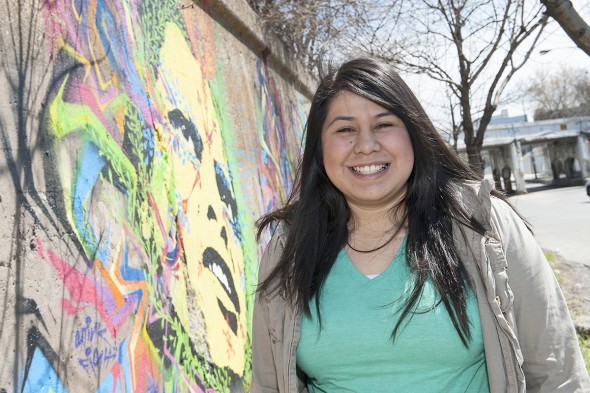Studying the dynamics of interaction between youth, police

“There is a long history of troubled relationships” between young people of color and police, says Georgina Enciso. Photo: Roberta Dupuis-Devlin/UIC Photo Services
Georgina Enciso wants to know everything she can about how young people of color interact with police.
Last summer, the Ph.D. student in the department of criminology, law and justice honed her research by way of focus groups in Chicago and Seattle.
Each group had 15 to 20 young people ages 18-29. There were two each — one African American, the other Latino — in both cities.
“I wanted to understand the dynamics of interactions with police — why they were negative, especially for those ages and [racial groups],” Enciso said. “There is a long history of troubled relationships.”
Working with Dennis Rosenbaum, director of UIC’s Center for Research in Law and Justice, and Ph.D. colleague Tom Christoff, she met with the focus groups in sessions that lasted three to four hours. Their work is funded by the National Institute of Justice.
“They were mostly youth-led,” Enciso said. “We wanted them to be the center of attention.”
The findings were in line with the procedural justice theory developed by Tom R. Tyler of Yale University, she said.
The young people revealed the importance of how they perceived their treatment by police. “One of the main things we learned is that if they were humiliated by the police, if they were disrespected, it was one of their justifications for not cooperating,” she said.
Even if a police contact ends up with a ticket being issued, youth will cooperate if they feel they were treated fairly — important for procedural justice work because it’s “based not on the color of their skin but the content of their character,” Enciso said.
“It’s our goal to bring back to police departments the feedback we got from youth in order to impact their training on how they interact with youth,” she said. “It could ultimately lead to changes in training.”
She hopes to go back to the focus groups, at least in Chicago, this summer or next fall to conduct role-playing by youth and police “so that each side can observe and understand how they are looked upon or portrayed by the other.”
Enciso is also involved in a survey of about 100 police and sheriffs’ agencies, conducted by the UIC-based National Police Research Platform. Rosenbaum is director of the project and Enciso is a researcher, along with others working at UIC and other universities.
A major part of the research, a survey related to police-community interaction, has similarities to her work with focus groups. “Police departments lack legitimacy if citizens don’t believe they can support their needs,” she said.
But it’s also important to remember that police have a difficult job, she said.
“We need to understand the pressures they face and where they’re coming from,” she said.
Enciso grew up in Compton, California. In high school she did volunteer work in the Los Angeles Sheriff’s Department as a Police Explorer. While pursuing a bachelor’s degree at the University of California, Berkeley, she served an internship with the Alameda County Probation Department.
She worked with young people who’d gotten into trouble. “They saw me as a role model, as a Latina in college,” she said. “I’d tell them they didn’t have to be in this life, that there was help.”
Enciso, who completed her master’s degree at UIC last May, would like to teach in a California community college after graduation. “I want to reach out to students and encourage them to complete their education,” she said.
Enciso lives on the South Side with her partner, Hector Paredes, a DIRECTV cable installer whom she met at Berkeley. She enjoys walking with her dog, a 2-year-old mastiff — “a huge puppy” — named Blue. She likes to visit museums and take trips back to California.
Much of her interest in helping young people springs from her background.
“Compton was not known for anything positive — gangs and violence,” Enciso said. “I was the youngest of seven, and my parents worked hard to keep us out of trouble. A lot of my friends in high school were killed or involved in gangs.
“I’m interested in how I and my siblings did not get into this life, and why my peers were susceptible. I’ve been drawn to this since I was in high school.”
